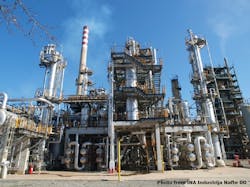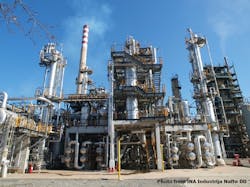Croatia’s INA weighs shutdown of Sisak refinery’s FCC plant
Croatia’s INA Industrija Nafte DD is proposing permanently shuttering the fluid catalytic cracking plant at its 44,000-b/d in Sisak, Croatia, 30 miles south of Zagreb, as part of an organizational strategy to boost performance and competitiveness of its Croatian refining business.
Based on results of a Deloitte report analyzing options for improving the refinery’s negative financial performance commissioned by INA in early 2017, the proposed shutdown of Sisak’s 10,000-b/d FCC aligns with the report’s broader conclusion that conversion of the refinery into a logistics center would be the most cost-effective, long-term solution for maintaining sustainable operations at Sisak, INA said.
According to the Deloitte analysis, Sisak’s conversion into a logistics hub by 2021 would generate $93 million in cash flow during the next 3 years compared with the refinery’s current mode of operation.
The proposed 3-year conversion process would coincide with the concurrent construction of a heavy residue upgrading plant at INA’s 90,000-b/d Rijeka refinery along the northern part of the Adriatic Sea, which would include a delayed coker, a coke port, storage installations, as well related pipelines and off sites, the operator said (OGJ Online, Mar. 22, 2016).
Several proposals from Deloitte’s analysis combine a possibility of transporting oil partially processed products between both refineries during the conversion and construction period to maximize use of processing capacities at the sites, including potentially using Sisak installations for production of bitumen and calcified coke.
The Sisak refinery would continue primary refining activities in intervals during the 3-year period, with secondary processing installations at the site to operate continuously and without interruption, INA said.
Now submitted to and under review by INA’s Works Council, the proposed shutdown of Sisak’s FCC, if approved, would take place sometime during this year’s second half.
Regarding impacts to employment at the site, the operator said it will work to redistribute the 40 jobs that would be eliminated following the FCC’s shuttering to vacant positions within the company in line with business needs and employees’ qualifications or issue severance payments in amounts well above the Croatian average.
Part of a proposed long-term sustainability plan also includes potentially converting the Sisak manufacturing site into a biorefinery.
INA initiated the official tendering process for construction of Rijeka’s delayed coking plant and associated installations in late 2017, according to a Nov. 27, 2017, release from the operator.
The company said it plans to reach final investment decision on the Rijeka residue upgrading project during this year’s first half.
INA is jointly owned by Hungary’s MOL Group subsidiary MOL PLC 49.1%, the Republic of Croatia 44.8%, and private and institutional investors 6.1%.
Contact Robert Brelsford at [email protected].

